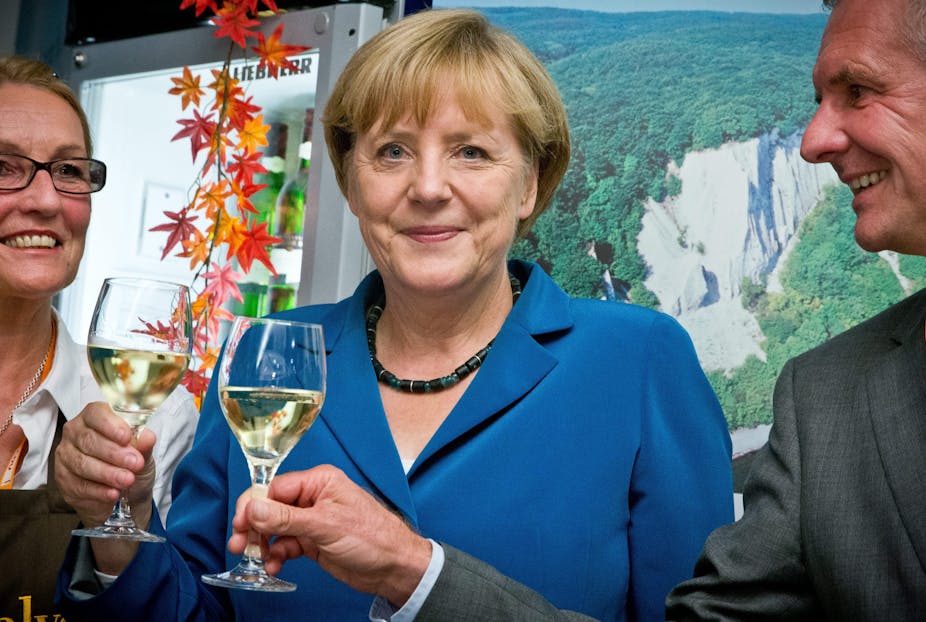When the term “factor” is used in the description of political power, one is reminded of sunscreen or perfume: an ingredient to ingest. One is certainly not reminded of German chancellor Angela Merkel, who on Sunday won a thumping victory with her Christian Democratic Union (CDU) party.
The achievement is made even more remarkable by the fact that Merkel might yet net an absolute majority, a rare feat in German politics. Current figures show that Merkel has garnered 42% of the vote, though the final figures will depend on whether parties such as the Eurosceptic Alternative for Germany (AfD) break the 5% threshold for parliamentary representation.
National assumptions are the oldest assumptions in the dog-eared book of stereotypes. Political analysts pretend to draw on scientific projections when merely reformulating old prejudices. But in dealing with Merkel, we have a few that stand out. In 2009, prior to the previous election, Detmar Doering of the Liberal Institute in Potsdam claimed that:
German voters aren’t stupid – they don’t want a Britney Spears as the chancellor of Germany, they want a serious leader whom they can trust. Merkel knows what she is doing.
Then, Doering explained that Merkel’s pragmatism was what reassured German voters. Yes, dour she might be, and most certainly lacking charisma. But such absences did little to detract from her as the modest but industrious worker who was determined to right the ship in crisis. In fact, that unwavering pace, the squeaky clean commander of budget and fatherland, has proven a formidable proposition. As her biographer (she has many) Ralph Bollmann has suggested, Merkel:
…fits the cliché that we Germans have of ourselves: frugal, sombre, awkward and a bit unpolished in a likeable way.
No rocking boats. No disturbances. No excitements. No fuss. Merkel lives without ostentation. Much of this can be gathered from Merkel’s reaction the night the Berlin Wall fell in 1989. Instead of joining the ecstatic throngs of people pouring through the breaches, she preferred a sauna and the company of friends.
The clean political image was already well on the way to being cultivated in December 1999 when she broke with her political mentor Chancellor Helmut Kohl in a letter published in the Frankfurter Allgemeine Zeitung. That very public gesture distanced herself from the rot of campaign finance and the scandal that took Kohl with it. It also ushered in a period of spring cleaning for the centre-right CDU, with Merkel sporting a particularly effective broom.
This particular election campaign has also stressed the bland over the colourful and boisterous. “Chancellor Merkel has run a bland re-election campaign. But that is exactly what voters were looking for,” noted Charles Hawley for Spiegel Online. In contrast, the leader of the Social Democrat Party (SPD) - Merkel’s main opposition - Peer Steinbrück has tended to resort “to brash humour” in winning the vote. Despite doing so, he barely made a dent in the Merkel offensive. His results were telling: 26.4% is the second worst result for the SPD since World War Two.
Steinbrück’s invisibility as an opponent is a feature of an election campaign distinctly devoid of that nastiness that desperation breeds. Merkel leaves no one in doubt what ship she commands, one which, to borrow an expression from West Germany’s first chancellor Konrad Adenauer, would involve “no experiments”.
Such politics does come at a price. The vote in the eastern part of Germany is set to be lower. “People in the eastern states,” explains political scientist Gero Neugebauer of the Free University in Berlin, “are increasingly disaffected with national politics – many feel disadvantaged and powerless to affect change”. The eastern state of Saxony-Anhalt hit a low of 60.5% in turnout in 2009. Neugebauer’s thesis here is that many eastern Germans are now exercising their right not to cast a ballot. This was not a luxury to be had during the times of the German Democratic Republic.
Then there is Merkel’s record on, for example, the exposure of massive surveillance measures, both by the United States’ National Security Agency and Britain’s GCHQ. This has proven patchy at best. In fact, Jan Philip Albrecht, a German member of the European Parliament representing the Green Party took careful aim at her record on that point.
With her silence about the massive surveillance measures of Britain’s GCHQ intelligence service, Angela Merkel, as the most important EU leader, has massively damaged united Europe.
The European image of Merkel’s policies has often been crude, be it as a scrooge who wishes that other countries could better balance their books, or as a work-obsessed leader who wishes everyone did as her. In debt-crippled Greece, Merkel’s poster appearance as a new Hitler typified this reaction.
While Merkel is set for another term, it will be without her Free Democratic Party (FDP) coalition partners. The first two years of Merkel’s second term were in part affected by the FDP’s combative Guido Westerwelle, who felt that a showing of 14.6% in the polls warranted him to dictate the agenda to Merkel. His failure to sway Merkel saw his own demise, toppled by Philipp Rössler. German voters have repaid the FDP in kind, making sure that the party will have no representatives in the Bundestag lower house for the first time in the post-war era.
All of this points to the famous German longing for quietness, and it is a longing that Merkel has been satisfying for some time. But how she will press on with an austerity doctrine that has shown itself to be the sticking point of European politics, and how she manages Germany’s hegemonic status on the continent, will bring her another round of headaches.

